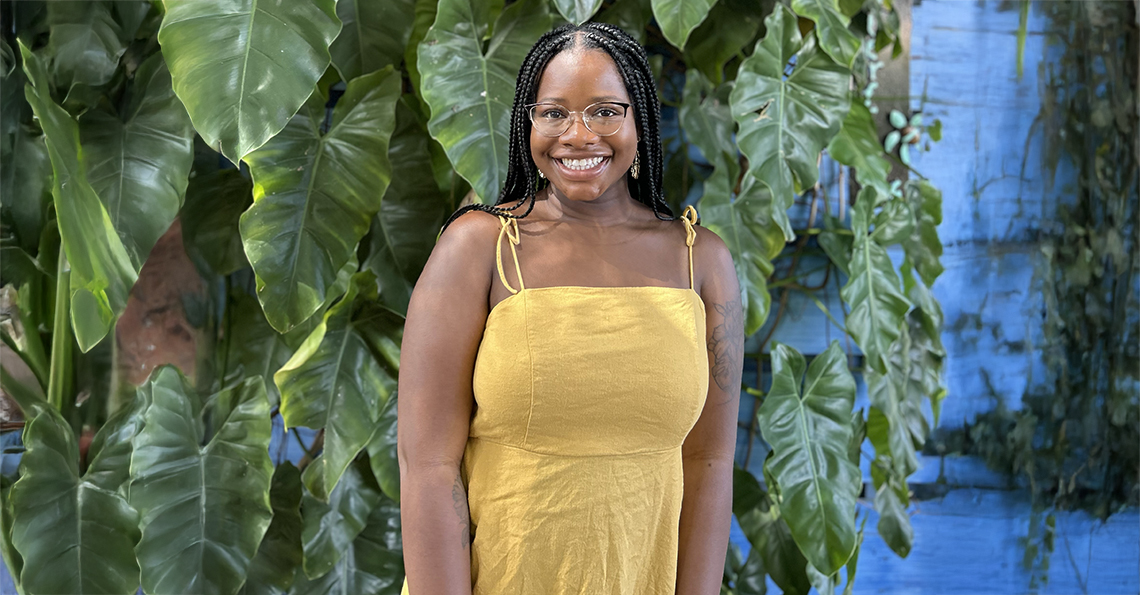Bridging classroom learning and real-world impact

Anisah McEwan, MPH ’24
Health Behavior and Health Education
Anisah McEwan, MPH ’24, always wanted to change the world. Once she arrived at the University of Michigan School of Public Health, she understood it takes a collective effort.
“I want to be part of the change, but there's only so much one person can do,” said McEwan, who received a Master of Public Health in Health Behavior and Health Education from the University of Michigan School of Public Health. “I realized when I came to Michigan Public Health, it’s ‘we,’ not ‘me.’ I feel like coming here, there are so many people who have the same mindset who want to achieve the same or similar goals, and it was just really affirming that I was on the right path.”
Growing up in Maine, McEwan developed a devotion to science and helping others, leading her to earn a bachelor’s degree in Biology and General Sociology from Colgate University. Her passion served as an inspiration to pursue a career in public health, where she could combine her love for data with community engagement.
In 2021, she arrived in Ann Arbor to take part in the Future Public Health Leaders Program (FPHLP). This residential program, funded by the Centers for Disease Control and Prevention, introduced her to the University of Michigan and its Public Health Action Support Team (PHAST).
Through field placements, skill building workshops and mentorship, Michigan FPHLP provides students with opportunities for growth, learning and awareness in the field of public health. The ultimate goal of the program is to increase the diversity of the public health workforce, and the people committed to reducing health inequities. (The FPHLP 2025 application opened Nov. 1, and will close Jan. 31 at 11:59 p.m. EST. Learn more about the application process today.)
Michigan FPHLP students are housed on the Ann Arbor campus for 10 weeks to dive deep into the field of public health. Students participate in curriculum days at Michigan Public Health and engage with public health professionals through their field placements.
I want to be part of the change, but there's only so much one person can do. I realized when I came to Michigan Public Health, it’s ‘we,’ not ‘me.’ I feel like coming here, there are so many people who have the same mindset who want to achieve the same or similar goals, and it was just really affirming that I was on the right path.”
PROSPECTIVE STUDENT? Learn more about Michigan Public Health.
“Everybody at FPHLP was telling me you have to join PHAST,” McEwan said. “PHAST met my need of wanting to have hands-on experience—I didn't just want to be in class learning about public health.”
With this encouragement, she enrolled at Michigan Public Health to pursue a master’s degree in Health Behavior and Health Education. (The department was renamed Health Behavior & Health Equity shortly after McEwan’s graduation.)
PHAST allowed her to work on real-world public health projects and gain practical experience, something she found invaluable. She found the differences between classroom learning and real-world experience striking. In the classroom, projects often remain theoretical.
“In the classroom, your work starts and ends there,” McEwan said. “With PHAST, your work has larger implications.”
One of her most memorable experiences at Michigan Public Health was her participation in a trip to Grenada.
Over the course of spring break in February 2024, McEwan undertook a life-changing trip to the Caribbean island with the 15-member PHAST, led by Laura Power, an infectious disease physician, a clinical associate professor of Epidemiology, and director of the school’s Office of Public Health Practice; Sadé (Richardson) Mulkey and consultant Rohan Jeremiah, MPH ’06.
Along with four other PHAST members, her team project involved partnering with the Grenada Ministry of Social and Community Development, Housing, and Gender Affairs to establish a Disabilities Affairs Unit. This required conducting focus groups and key informant interviews with people with disabilities, their caregivers and other stakeholders.
“We were conducting focus groups and key informant interviews to establish a Disabilities Affairs unit in the Ministry of Grenada,” said McEwan, who gained a deeper understanding of public health practice.
The trip to Grenada was eye-opening for her in many ways. However, the trip wasn't without its challenges. McEwan encountered some mistrust from the community due to past interventions by other groups. Despite these challenges, she found building rapport with the community to be a rewarding experience.
“There was a big learning curve,” she said. “I feel like everybody in public health wants to make an immediate change but that change takes time.”
READ ABOUT the 2024 PHAST trip to Grenada.
The Grenada trip really solidified that this is where I get my energy. I get my boost from being out in the community.”
In addition to the professional growth she experienced, the trip to Grenada also allowed McEwan to connect with her Caribbean roots. Her parents are from the Bahamas and the Virgin Islands, and she cherished the cultural connection the trip offered.
“Even though I’m not Grenadian, just similarities in the food and culture felt like a full-circle moment,” she said.
Beyond the professional insights, McEwan valued the personal connections she made during the trip. Whether it was eating lunch with participants or exploring local markets, these experiences enriched her understanding of the community.
Her PHAST experience has not only shaped her career path but also reinforced her commitment to improving community health. With her dedication, McEwan is poised to make significant contributions to the field of public health, reflecting the very best of Michigan Public Health’s mission.
“The Grenada trip really solidified that this is where I get my energy,” McEwan said. “I get my boost from being out in the community.”
